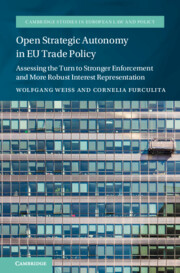 Open Strategic Autonomy in EU Trade Policy
Open Strategic Autonomy in EU Trade Policy Book contents
- Open Strategic Autonomy in EU Trade Policy
- Cambridge Studies in European Law and Policy
- Open Strategic Autonomy in EU Trade Policy
- Copyright page
- Contents
- Preface
- Abbreviations
- 1 Introduction
- Part I EU Trade Policy and Its Constraints
- 2 The EU’s Trade Policy
- 3 External and Internal Constraints for the EU’s Open Strategic Autonomy in Trade Policy
- Part II The Tools for Stronger Enforcement of Trade Rights
- Part III The Tools for Assertive Representation of EU Interests
- Bibliography
- Index
2 - The EU’s Trade Policy
Past and Prospect
from Part I - EU Trade Policy and Its Constraints
Published online by Cambridge University Press: 29 November 2024
- Open Strategic Autonomy in EU Trade Policy
- Cambridge Studies in European Law and Policy
- Open Strategic Autonomy in EU Trade Policy
- Copyright page
- Contents
- Preface
- Abbreviations
- 1 Introduction
- Part I EU Trade Policy and Its Constraints
- 2 The EU’s Trade Policy
- 3 External and Internal Constraints for the EU’s Open Strategic Autonomy in Trade Policy
- Part II The Tools for Stronger Enforcement of Trade Rights
- Part III The Tools for Assertive Representation of EU Interests
- Bibliography
- Index
Summary
Chapter 2 analyses the evolution of the EU Trade Policy and how it reached the new focus on stronger enforcement of EU’s trade rights and ensuring a level playing field in trade, i.e. more assertively representing EU interests. Thus, it depicts how initially EU Trade Policy was mainly focused on multilateralism in the WTO context, then shifted to combining multilateralism with active bilateralism by signing deep and comprehensive FTAs, and finally adopted the reviewed trade policy based on ’open strategic autonomy’ model seeking a more assertive trade policy, which is also presented in more detail herein. It also explores the drivers that instigated this reorientation of trade policy, in particular the crisis of trade multilateralism, the rising nationalism, the systemic challenges posed by the Chinese exceptionalism, as well as digitisation, climate change, and COVID-19.
Keywords
- Type
- Chapter
- Information
- Open Strategic Autonomy in EU Trade PolicyAssessing the Turn to Stronger Enforcement and More Robust Interest Representation, pp. 25 - 62Publisher: Cambridge University PressPrint publication year: 2024
